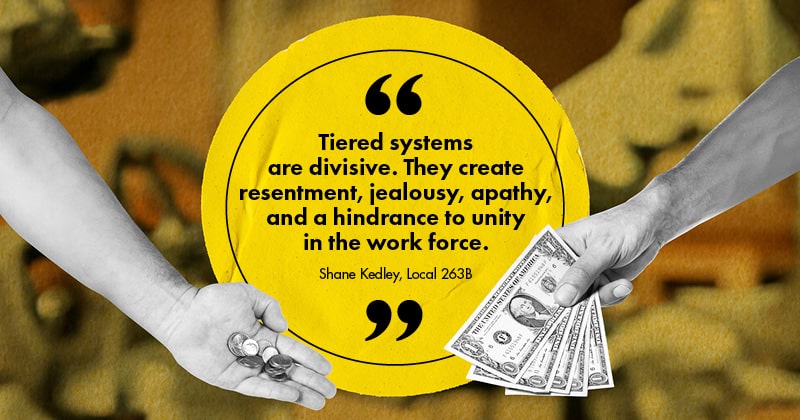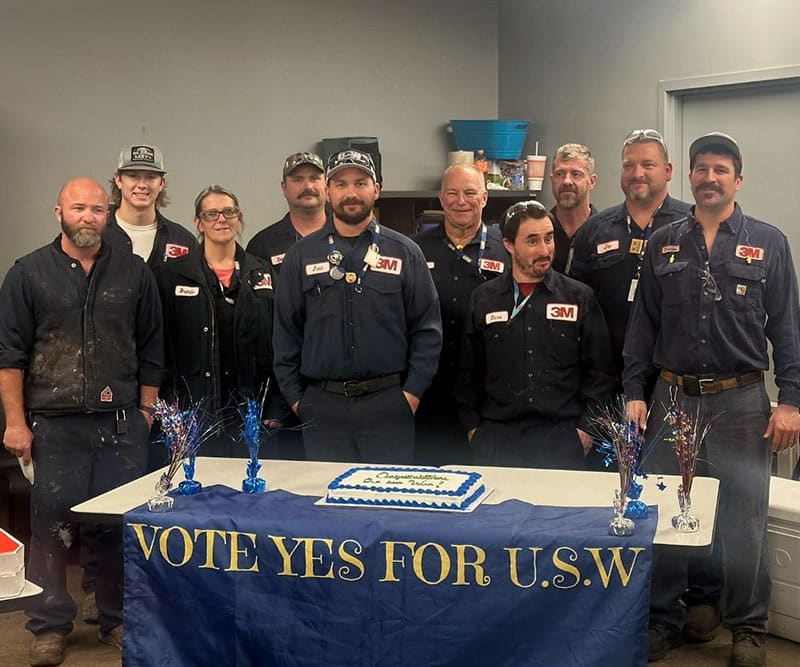Divided We Fall: USW Members Working Hard at Stripping Away Two-Tiered Systems

When Rob Burd went to work at the Sensus/Xylem plant in Uniontown, Pa., in 2015, he knew that, under the contract in place at the time, he likely would not have a chance to earn wages as high as others who came before him and did the same work.
“I was part of the two-tier system,” Burd said. “It’s wrong when these companies are making so much money off of our labor and you have two people working beside each other doing the same work and one is making two or three dollars more than the other person.”
Later, when Burd ran for unit president of Local 13836-1, his top priority was to eliminate the two-tier system that had been part of the contract since 2013.
During those negotiations, members overwhelmingly rejected two company proposals, and were headed for a possible strike, before the company came back with a proposal that eliminated two-tier language. A two-thirds majority of members ratified that contract.
Burd said the two-tier issue helped build the solidarity necessary to get a strong contract.
“We could not have done this without all of us sticking together,” he said. “Our committee, they hung in and never wavered and without that we would not have been able to get a good contract.”
Conway Priority
When late International President Tom Conway took the helm of the USW in July 2019, he made a promise that his administration would work to reduce or eliminate tiered wage and benefit systems in union contracts.
Over the past four years, Burd and his siblings and countless other USW members made major progress in that fight for equality.
“Righting these wrongs helps everyone, but in particular, it supports our newer members. It also strengthens our union even more in the long run,” Conway said this summer. “We are one union, and our success in remaining united often depends on resisting these deals and dismantling them everywhere we can.”
Conway, who passed away Sept. 25, was always quick to deflect the recognition for that success to rank-and-file leaders, particularly the members of the USW’s Next Gen program.
“A large portion of the credit goes to our Next Gen activists who have been at the forefront of prioritizing and driving this issue,” he said. “I’m extremely proud of the folks at the bargaining table who were able to negotiate these wins.”
Sowing Division
Unscrupulous employers often look for ways to divide union members, whether by age or job classification or other factors, and multi-tiered wage and benefit systems can play into bosses’ hands by helping them to serve that purpose.
“Employers know how powerful we are when we’re united,” Conway said. “So they try to drive wedges between us, pitting new workers against more senior members.”
Like Burd and his siblings, Shane Kedley and the members of Local 263B at the A.Y. McDonald brass foundry in Iowa worked under a two-tier system that began in 2008.
Kedley said that, at first, the system did not affect the USW membership, but over the years, as workers retired and were replaced, new hires made $2.50 per hour less than their peers. That situation, he said, created problems for the company as well as the union.
“With the difficulty with hiring and retention in the foundry, the company really had no choice” but to agree to eliminate the two-tier system, he said.
The most recent contract for the A.Y. McDonald workers was a step forward in building a more unified local, he said.
“Tiered systems are divisive,” Kedley said. “They create resentment, jealousy, apathy, and a hindrance to unity in the work force.”

More Than Wages
In addition to wages, some employers use two-tier systems to give newer workers lower-quality health care or retirement benefits than others, or to impose unequal compensation systems on people performing the same work in different locations.
Kerry Halter and other members of Local 752L drew a line in the sand during contract negotiations four years ago and forced management at the Cooper Tire plant in Texarkana, Ark., to ensure that all members began receiving equal pay for equal work.
“Greedy corporations and CEOs like to see how much money they can save on the backs of their workers,” said Halter, the local president. “At some point in time, you just have to say enough is enough, and we’re going to stand up and fight for fair wages and benefits.”
Under Cooper Tire’s system, workers who joined the Texarkana plant beginning in 2009 made only 85 percent of what co-workers hired before them did. Many companies soon realize, however, that the money they save isn’t worth the problems the system creates.
“It may save companies money on the front end, but in the end, it doesn’t work out,” Halter said. “It’s going to affect morale. It’s going to affect quality. It simply isn’t worth the money.”
Two years ago, for example, USW members at nine locations across the country successfully beat back an attempt by Allegheny Technologies Inc. (ATI) to impose a second, lower tier of health care benefits for future workers.
UPS ended its two-tier wage system this summer after workers came close to striking in their fight for a fair share of the company’s staggering wealth. And, today, thousands of autoworkers are demanding the elimination of tiered wage and benefit scales.
“In plain terms, they’re trying to bust the union,” explained Joe Oliveira, who was vice president of USW Local 1357 in New Bedford, Mass., during the union’s 2021 battle against ATI. “The easiest way for them would be to let us fight each other and tear ourselves apart.”
When union workers eliminate such systems, they gain an even stronger voice in the work place.
“We all understood what we needed to do,” Halter said. “This brought a lot of people together.”
Growing that unity and solidarity was the goal of Conway’s initiative, and it has paid dividends for members across the continent in a range of industries, from health care workers in Local 7600 at Kaiser Permanente and Local 9600 at Oroville Hospital, to rubber workers in Local 831 at Goodyear and Local 1023 at Yokahama.
Success in eliminating tiers has come from workplaces large and small, improving lives and building solidarity for thousands of members. In the paper industry, one of the largest employers of USW members, workers achieved a series of strong contracts that cut tier systems, including in the union’s master agreement with International Paper, and Local 1013 and Local 1853 at Georgia Pacific.
There is still work to be done to eliminate tiers in all USW contracts, but workers across the union are taking Conway’s initiative to heart, eliminating or phasing them out at places like Local 37 at Steel of West Virginia Inc., Local 721 at Braskem, Local 1693-04 at American Synthetic Rubber, Locals 1693-21 and 1693-26 at Hussey Copper and Hussey Fabrication, Local 7153 at Special Metals, Local 2659 at St. Mary’s Cement, and many others.
“The bottom line is that, at the bargaining table and in our workplaces, we should be building unity and not division,” International President David McCall said. “Eliminating tiers in our agreements brings us closer together in a number of important ways, and that only makes our union stronger.”
By clicking Sign Up you're confirming that you agree with our Terms and Conditions.
Recent News Articles
Want to Learn More?
See how the USW is making a real difference in our communities and our workplaces.

